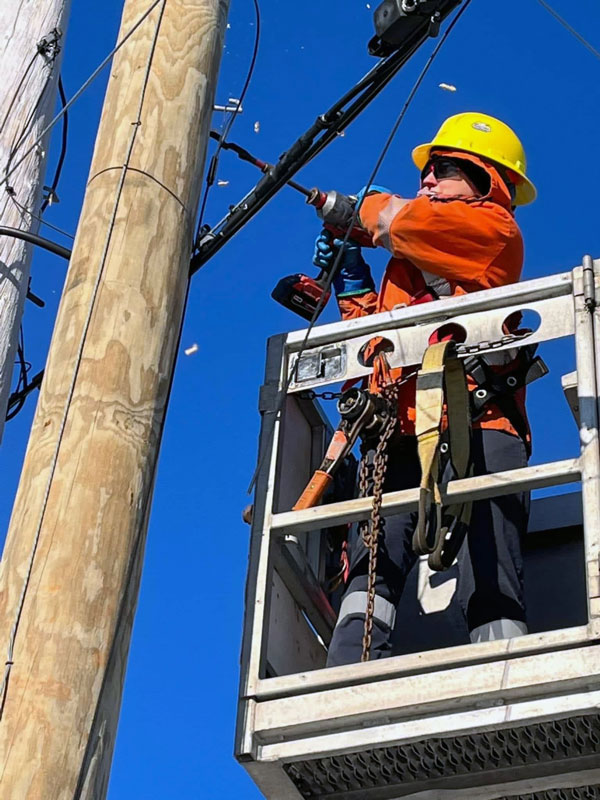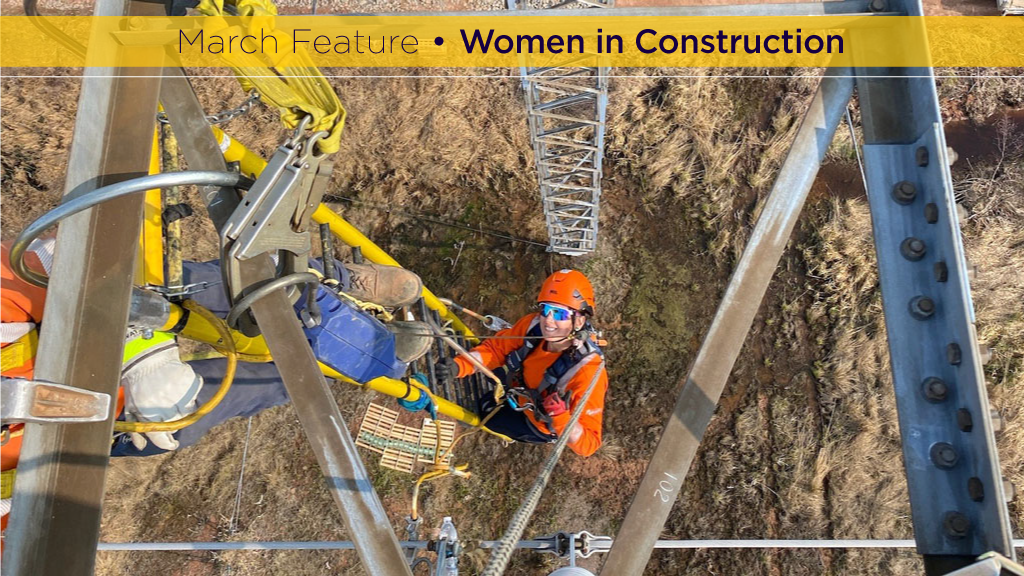Although not wanting to go into too many details, Connect Atlantic Utility Services powerline technician Melissa Dawe says she didn’t have the easiest childhood, notably dealing with the death of her mother when she was only 12.
But those experiences helped shaped the person she is today, “specifically someone who is driven to help others.”
Although working in a physically challenging job that often requires her to be away from home for extended periods, the 28-year-old mother of two boys still finds the time to give back to her union and her community.
Dawe is a volunteer secretary for Unit 9 of the International Brotherhood of Electrical Workers and a member of the union’s NextGen committee which is dedicated to attracting young people into the industry.
She also serves as a volunteer firefighter with the Springhill, Nova Scotia fire department on her days off.
“It is definitely tough to manage career, family and the volunteer fire service, particularly as my job takes me away from home frequently,” she says.
But she also makes a point to find the right balance in life and works out to keep fit for her powerline and firefighting duties.
Like many who have chosen a skilled trades career, Dawe’s entry into the powerline technician field wasn’t straightforward.
“How our electrical infrastructure is maintained is something I did not give much thought to during the earlier years of my life,” says Dawe, who studied carpentry in high school, but didn’t pursue it.

Instead, she obtained a position as a traffic safety set up controller on road projects.
“That (experience) led me down the path to where I am today.”
Dawe explains she had a close up view of the work powerline technicians perform and that helped “fuel and sustain” her desire to be one.
That goal was accelerated amidst the trail and destruction inflicted across Nova Scotia and other parts of the Maritimes in 2019 by Hurricane Dorian. She was able to observe the “incredibly complex skills” required to restore toppled powerlines and towers.
“I realized in that moment that this checked so many boxes for me,” says Dawe, citing the opportunity to work in a skilled career as part of a team which helps people in “a meaningful and immediate way.”
Dawe had actually applied for enrolment in Nova Scotia Community College’s Power and Utility Line Work Program in 2018. At that time, there was a two-year waiting list. However, she was accepted into the program in 2020 and graduated with honours in 2021. She was the only female in a class of 26.
Upon graduation she obtained a position with VistaCare Communications installing fibre optic cables in Nova Scotia and New Brunswick and joined the IBEW.
She was allowed to work part time on as-needed basis for powerline construction and repair firm Tri-Wire �鶹��ý����ion, which enrolled her into the Powerline Apprenticeship Program.
During her time with Tri-Wire she was a member of a convoy of contractors who were dispatched to Maine in January 2022 when a severe storm slammed into large parts of eastern United States and Ontario.
“I can still remember the sense of awe and belonging I felt at seeing what seemed to be an uncountable number of powerline trucks making their way to the U.S. border, ready to go and support our American neighbours.”
Dawe was on an IBEW potential workers’ list and that eventually led to a job offer from Connect Atlantic Utility Services, with her apprenticeship being switched over.
“I still remember getting the phone call (offering her a job) and the feeling of excitement and anticipation I felt as my heart started racing at the prospect of being able to really begin my powerline apprenticeship and career. It was an opportunity I could not pass by.”
That invitation came in May 2022. Just a few months later Dawe went through what might be described as her “baptism of fire.”
In autumn of that year Hurricane Fiona slammed the Maritimes and other parts of Eastern Canada. As part of the powerline reconstruction efforts, Dawe was stationed in Cape Breton Island and worked for 22 days straight.
But although she has to scale high power poles, often in appalling weather conditions, she has never once regretted becoming a powerline technician.
“Ever since I started here (Connect Atlantic) it has been great,” says Dawe, citing the help she receives from fellow employees and the opportunity to work on a wide variety of transmission and distribution projects.
“Ultimately the things I love most about my job and my industry is the immense sense of camaraderie and family,” says Dawe, noting that bond is an absolute necessity in a potentially dangerous line of work.
As for helping people, this has always been something that has always been important.
“Whether it is going into a fire to help save a family’s home or being part of a team that helps get power reconnected to a nursing home, helping others is something I am passionate about.”



Recent Comments
comments for this post are closed